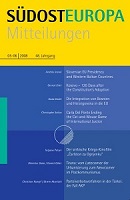Ungarn: Erinnerungskultur und politische Konflikte
Hungary: The Culture of Remembrance and Political Conflicts
Author(s): Krisztián UngvárySubject(s): History
Published by: Südosteuropa Gesellschaft e.V.
Keywords: culture of remembrance; democracy; law; Hungary; FIDESZ; Jobbik
Summary/Abstract: The culture of remembrance pursued by the state has always mirrored the concepts of democracy and law of those in power. It also reflects the political structure in the respective countries. For three years Hungary has been led by a government that describes itself as anti-communist and centre right, despising its predecessors as post-communists. A closer analysis shows in how far this definition is justified. It should be noted that the culture of remembrance in Hungary differs strongly from those in West European countries regardless of the single parliamentary terms. The differences might be explained by the particular Hungarian past and the relatively short period of political freedom since 1990. One special feature of the policy of remembrance pursued by the FIDESZ party in Hungary is that it is indistinguishable in its contents from the cultural program of the neo-national socialist Jobbik party. In order to conceal those very problematic contents FIDESZ performs a double culture of remembrance with a double media landscape: Both the moderate as well as the radical national socialist voter will be satisfied with the offers that are directed centrally by the government. It would be wrong to suppose that FIDESZ offers its cultural program to its biggest competitor (Jobbik) because it intends a coalition government with this party. On the contrary: The policy of remembrance in Hungary also serves to bind the electorate of the other parties.
Journal: Südosteuropa Mitteilungen
- Issue Year: 2013
- Issue No: 03-04
- Page Range: 180-192
- Page Count: 13
- Language: German
- Content File-PDF

